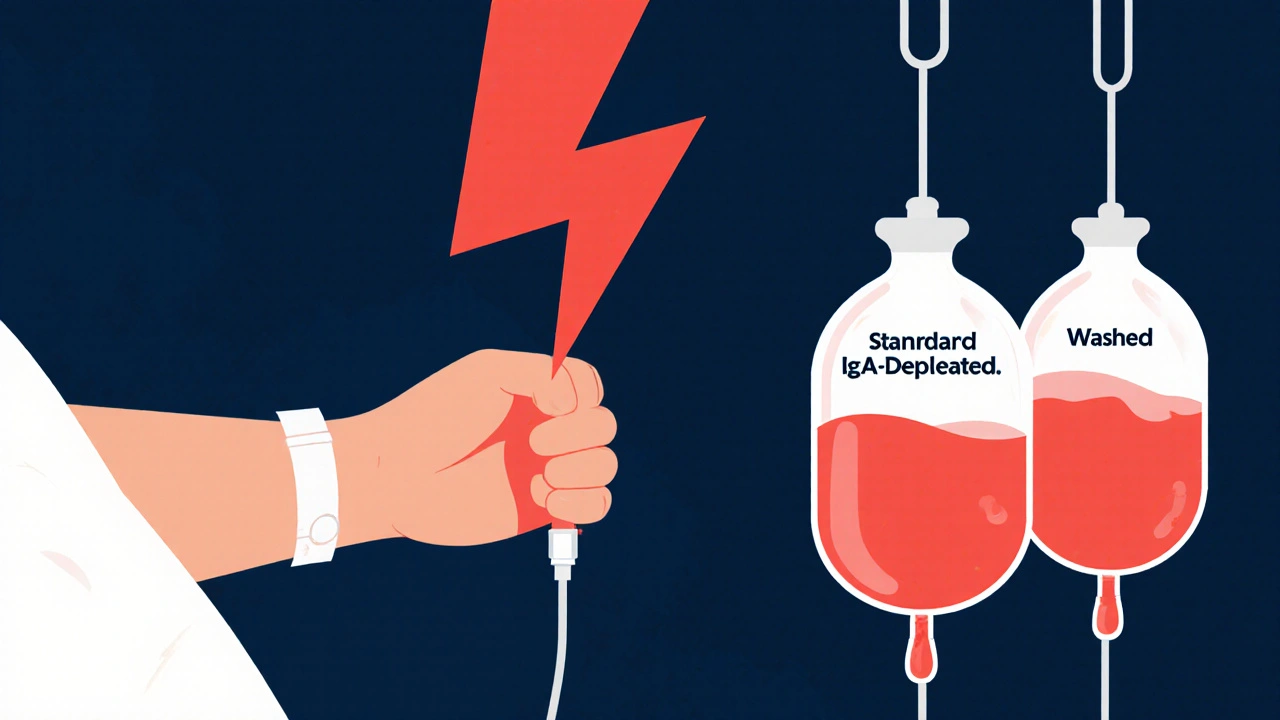Most people have never heard of IgA deficiency - and that’s not surprising. It’s quiet, often invisible, and doesn’t show up on routine blood tests. But for the 1 in 500 people who have it, especially in Caucasian populations, this condition can turn a simple blood transfusion into a life-or-death situation. IgA deficiency isn’t just a lab result. It’s a real, documented immune disorder that affects how your body defends itself at the front lines - your lungs, gut, and sinuses. And if you need a transfusion, not knowing about it could cost you your life.
What Exactly Is IgA Deficiency?
Immunoglobulin A, or IgA, is the most abundant antibody in your body - but not in your blood. It’s the shield lining your mucous membranes. Think of it as the first line of defense: saliva, tears, the lining of your intestines, your airways. When germs try to sneak in through your nose or mouth, IgA is there to neutralize them before they take hold.
Selective IgA deficiency means your body makes almost none of it - less than 7 mg/dL in your blood, while IgG and IgM levels stay normal. It’s not caused by drugs or illness. It’s genetic. If someone in your family has it, your risk jumps 50 times higher. And it’s the most common primary immunodeficiency you’ve never heard of.
Here’s the twist: 90 to 95% of people with IgA deficiency never know they have it. They don’t get sick more than anyone else. But that 5 to 10% who do? They face a cascade of problems - recurrent sinus infections, ear infections, bronchitis, pneumonia, chronic diarrhea, and even celiac disease. About 1 in 5 develop autoimmune conditions. Allergies? They’re common too - asthma, eczema, allergic rhinitis. It’s not that IgA deficiency causes these. It’s that without that mucosal shield, your immune system gets confused and starts attacking your own tissues.
Why Transfusions Are Dangerous
If you have IgA deficiency and need a blood transfusion, the danger isn’t from the blood itself. It’s from what’s in it - IgA protein.
Because your body never made IgA, your immune system doesn’t recognize it as ‘self.’ Over time, your body may start producing anti-IgA antibodies - IgE or IgG types - as if IgA were a foreign invader. These antibodies don’t cause problems until you’re exposed to IgA again. And that happens during a blood transfusion.
When that happens, the reaction is fast. Within minutes, you could develop hives, swelling, trouble breathing, a sudden drop in blood pressure, or even go into cardiac arrest. About 15% of these reactions are severe enough to be life-threatening. And here’s the scary part: 1 in 1,000 transfusions in IgA-deficient patients triggers a reaction. That’s not rare. That’s predictable.
Doctors used to think this was rare. Now we know better. Studies show 20 to 40% of IgA-deficient people develop anti-IgA antibodies. And every time they get blood without precautions, the risk goes up. Dr. James Fernandez from Cleveland Clinic puts it plainly: “Transfusion reactions in IgA-deficient patients can be fatal in up to 10% of cases when standard blood products are used.”
How to Prevent a Transfusion Reaction
There are two proven ways to make transfusions safe for people with IgA deficiency:
- IgA-depleted blood products - These are processed to remove almost all IgA, leaving less than 0.02 mg/mL. They’re the gold standard.
- Washed red blood cells - The blood is spun in a centrifuge and rinsed with saline to wash away plasma proteins, including IgA. This removes 98% of the antigen.
Both options require special preparation. IgA-depleted products take 48 to 72 hours to order. Washed cells take 30 to 45 minutes to process. Neither is stocked on every hospital shelf. That’s why planning ahead matters.
Before any transfusion, patients should be tested for anti-IgA antibodies using ELISA. It’s 95% accurate - but 5 to 10% of tests give false negatives. So even if the test is negative, if you’re known to have IgA deficiency, assume you’re at risk. Treat every transfusion as high-risk.
For patients who’ve had prior reactions, doctors often give pre-medication: 40 mg of methylprednisolone and 50 mg of diphenhydramine intravenously before the transfusion. This cuts reaction rates by 75%.

What Patients Need to Do
If you’ve been diagnosed with IgA deficiency, you are your own best advocate.
- Wear a medical alert bracelet or necklace. It should say: “Selective IgA Deficiency - Requires IgA-Depleted or Washed Blood Products.”
- Carry a card. Print it. Keep it in your wallet. It should list your diagnosis, transfusion requirements, and your doctor’s contact info.
- Inform every doctor, nurse, and ER staff. Don’t assume they’ll know. A 2023 survey found that 42% of IgA-deficient patients had been treated by providers who didn’t know the necessary precautions.
- Don’t wait for an emergency. 78% of severe reactions happen in ERs where no one knows your history. If you’re scheduled for surgery, talk to the blood bank weeks ahead.
It’s not paranoia. It’s survival. One nurse forgetting to check your status, one bag of standard blood given by accident - and you could be in the ICU.
Diagnosis and Long-Term Management
Diagnosis is simple: a blood test. Quantitative immunoglobulin levels - measured by nephelometry or turbidimetry - show IgA below 7 mg/dL with normal IgG and IgM. You’ll also need proof that your body can still make antibodies after vaccines (like tetanus or pneumococcus). That rules out other immune problems.
But testing doesn’t end there. Because IgA deficiency often comes with other conditions, you need ongoing monitoring:
- Annual celiac screening - Check tissue transglutaminase antibodies. Up to 15% of IgA-deficient people have celiac disease, and without IgA, standard tests can miss it. You need IgG-based celiac tests instead.
- Biannual lung function tests - Recurrent infections can lead to bronchiectasis - permanent damage to the airways. Catching it early means better outcomes.
- Quarterly check-ins - Watch for signs of autoimmune disease: joint pain, fatigue, rashes, digestive issues.
There’s no cure. No pills to boost IgA. But with smart monitoring, most people live full, normal lives. A 20-year study showed 95% of IgA-deficient patients have a normal life expectancy - as long as they avoid complications.
What’s on the Horizon?
Researchers are working on solutions. One promising approach is recombinant human IgA replacement therapy. In early trials, giving patients lab-made IgA has helped restore mucosal defense without triggering immune reactions. But it’s still experimental. As of October 2023, only 12 people worldwide had received it.
Another idea: gene therapy. But that’s years away. For now, the best tools we have are awareness, preparation, and strict transfusion protocols.
Why This Matters Beyond the Individual
IgA deficiency isn’t just a patient problem. It’s a system problem. Hospitals don’t stock IgA-depleted blood because it’s expensive - up to 300% more than regular blood. Labs don’t routinely test for anti-IgA antibodies because guidelines vary. In the U.S., the American Association of Blood Banks says test everyone. In Europe, they say test only if there’s been a prior reaction. That 30% gap in practice means someone in one country might be safe, while someone just across the border is at risk.
Until there’s universal agreement and better access to safe blood products, the burden falls on patients. And that’s unfair.
Every time a person with IgA deficiency walks into an ER, they’re gambling. They hope someone asks the right question. They hope someone checks the chart. They hope someone remembers.
It shouldn’t be that hard.
Can IgA deficiency be cured?
No, there is no cure for selective IgA deficiency. It’s a lifelong condition caused by genetic factors. Treatment focuses on managing symptoms, preventing infections, and avoiding transfusion reactions. Some people may develop normal IgA levels over time, but this is rare and unpredictable.
Can you donate blood if you have IgA deficiency?
Yes, you can donate blood if you have IgA deficiency. Your blood is safe for most recipients. However, if you’ve developed anti-IgA antibodies, your plasma could cause reactions in IgA-deficient recipients. Blood banks typically screen donors for this, and if antibodies are found, your plasma may be excluded from use in transfusions.
Is IgA deficiency the same as celiac disease?
No, they are different conditions, but they’re often linked. IgA deficiency is an immune system disorder where the body doesn’t make enough IgA antibodies. Celiac disease is an autoimmune reaction to gluten. About 10-15% of people with IgA deficiency also have celiac disease. Because IgA is needed for standard celiac tests, people with IgA deficiency need IgG-based antibody tests instead to avoid false negatives.
What happens if someone with IgA deficiency gets a regular blood transfusion?
If they have anti-IgA antibodies, a regular transfusion can trigger a severe allergic reaction called anaphylaxis. Symptoms include hives, swelling, low blood pressure, wheezing, and shock. These reactions can be fatal in up to 10% of cases. That’s why special IgA-depleted or washed blood products are required.
Do all people with IgA deficiency need special blood for transfusions?
No - but you can’t assume you’re safe. About 20-40% of people with IgA deficiency develop anti-IgA antibodies. The rest may not react. But since you can’t predict who will develop antibodies, and because each transfusion increases the risk, all IgA-deficient patients are treated as high-risk. Pre-transfusion testing for anti-IgA antibodies is recommended, and if you’ve had any reaction before, you must use IgA-depleted or washed blood.
Can IgA deficiency be detected with a routine blood test?
Not usually. Routine blood panels don’t check immunoglobulin levels. IgA deficiency is diagnosed with a specific test called a quantitative immunoglobulin panel. This measures IgA, IgG, and IgM levels. It’s only ordered if someone has recurrent infections, autoimmune disease, or a family history. Many people go undiagnosed for years because they never get this test.

Comments (11)